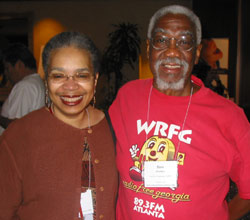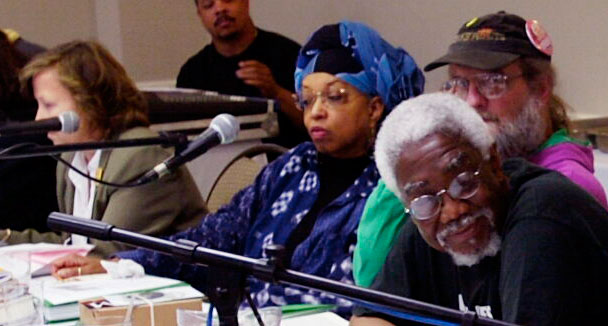| Ebon Dooley African-American poet, community activist, musician, and performance
artist Ebon Dooley is the name taken by Leo Thomas Hale. He was born in Milan, Tennessee, a small farming community, in 1942. He attended Fisk University in Nashville and was managing editor of the school's literary magazine. The name Ebon Dooley came from a college nickname Tom Dooley, after a character in a popular Kingston Trio song ("Hand down your head Tom Dooley.") Hale changed the first part of that name to Ebon, a pioneering black South American pilot. Ebon graduated from Columbia Law School in 1967. He served as a VISTA legal volunteer in Chicago and then moved to Atlanta in 1969 to take over management of the Timbuktu Bookstore. He managed still another book store specializing in Afro-American works until 1974. Ebon helped establish the Atlanta Center for Black Arts, and was on the board of directors of the Southern Education Program which was formed to recruit black teachers from the North for local colleges. He served for a short time as director of the newly formed Southeast Community Cultural Center of Atlanta in 1984. In more recent years Ebon has been associated with Atlanta's community radio stations, including several times as president of Atlanta's WBIG community radio station. [Source: Earlene J. Moore, Remembering Black Writers Associated with Tennessee; "Ebon (Leo Thomas Hale/Ebon Dooley)," in Trudier Harris and Thadious M. Davis, Afro-American Poets Since 1955 99-103 (Detroit: Gale Research Co., 1985)]
by Matthew Cardinale News Editor and National Correspondent Atlanta Progressive News (October 13, 2006) (APN) ATLANTA – Ebon Dooley, 64, a renowned activist, scholar, and poet, and one of the founding champions of WRFG Radio Free Georgia 89.3 FM, passed away yesterday, October 12, 2006. Activists are shocked and very sad and upset. “It definitely comes as a surprise. He was quite an incredible guy and had an incredible history,” Barry Weinstock told Atlanta Progressive News. Dooley had just participated in a radio show the night before he died, and he introduced Amy and David Goodman the night of their recent speech sponsored by WRFG at the First Iconium Baptist Church. While he had been out of commission a bit in the last few months due to health complications, it appeared like he had just turned the corner and was about to be back in the swing of things.
WRFG will hold a special public memorial event . . . . Dooley's birth name was Leo Thomas Hale, and he adopted the name Ebon during his college years as a young poet and activist, according to an archive of information about poets who are also lawyers maintained by Professor James Elkins of West Virginia University. Dooley never officially changed his name, Heather Gray said in an email to Atlanta Progressive News; however, most if not all accounts of him in recent decades refer to him as Ebon Dooley. The archive references at least two books mentioning Dooley's poetry, in addition to several works written by Dooley. Dooley had a book published called Revolution: A Poem (1968) by Third World Press. Poems published in various anthologies include “A Poem to My Brothers Killed in Combat or something bout a conversation with my father after Rev. King was killed;” “The Mighty John Hancock or: The Bigger They Are--the Harder They Fall;” “The Return to Order: The Peace Terms;” and “The Bust.” “Ebon Dooley is the name taken by Leo Thomas Hale. He was born in Milan, Tennessee, a small farming community, in 1942,” the archive states. “He attended Fisk University in Nashville and was Managing Editor of the school's literary magazine. The name Ebon Dooley came from a college nickname Tom Dooley, after a character in a popular Kingston Trio song ("Hand down your head Tom Dooley.") Hale changed the first part of that name to Ebon, a pioneering black South American pilot,” the archive explains. “Ebon graduated from Columbia Law School in 1967. He served as a VISTA legal volunteer in Chicago and then moved to Atlanta in 1969 to take over management of the Timbuktu Bookstore,” according to Elkins's archive. Dooley fulfilled numerous roles during his activist life. Dooley “took a sharp turn left,” after getting a law degree at Columbia University, he told The Atlanta Journal-Constitution Newspaper (AJC) in a 1998 profile. He held many positions at WRFG, including formerly President of the Board of Directors, according to another article in The AJC. Most recently he was Broadcast Director, Radio Host Adam Shapiro told Atlanta Progressive News. He ran one of the first Black-owned bookstores in Atlanta, called Timbuktu Market of New Africa. He came to Atlanta in 1969, The AJC reported. He held a law degree and used it to teach individuals about their legal rights. Dooley told the AJC he spent “countless hours using my knowledge of law to teach guys how to dodge the draft.” Dooley was a labor activist who worked with the Labor Party among other organizations. Dooley is listed as a member of the Pacifica Radio Board on their website as representing WRFG as an affiliate station. Pacifica's website already has special comments posted on his recent passing away. “I am saddened to tell you that on October 12 we have lost my friend and mentor Ebon Dooley,” WRFG Board President Heather Gray wrote in a mass circulated email. “He had not been well for some time, but we at WRFG are stunned by his loss. His contributions to WRFG and demands for justice in Atlanta, the southern region, the nation, and the world are incomparable. Ebon stands as one of the most brilliant and compassionate people I am fortunate to claim as my friend. But his friends are countless--so many of us have been fortunate to claim him as such,” Gray said. “In addition to all of the above and much more, Ebon was one of the early organizers of WRFG. At the recent WRFG event where Ebon introduced Amy and David Goodman, I mentioned Ebon is the heart and soul of Radio Free Georgia. This is almost an understatement! He has inspired us through his wisdom, his profound analysis, and his kindness. So many of us at WRFG have been privileged to be his friend and privy to his political, racial, and economic analysis coupled with humor and his constant radiant smile,” Gray added. “I worked with him when he was Liaison to the Program Committee,” Radio Host Adam Shapiro told Atlanta Progressive News. “I found him to be perhaps the most patient person I ever knew. There were times I'd see him exasperated, but I never saw him lose his temper or anything,” Shapiro said. “There was never any prejudice in him. He was really accepting. If you walked into his office, he would be in intense conversation with someone. He really liked to ‘kibbutz,' which in Yiddish means a lot of talk. A LOT of talk,” Shapiro said. “He was truly committed to the idea that radio could bring about social change, that the things we do make an actual difference,” Shapiro said. “He brought a lot of enthusiasm. To him it really was a place of inclusion and everyone was welcome,” Shapiro said.
Barbara Joye said she was “shocked” because she had just heard Dooley on the radio the night before. “He was talking about growing up in Tennessee where they let the White and Black kids out for different vacations,” Joye recalled. “We met when I was teaching English at one of the Atlanta University colleges. It must've been 1971. That's when he had his bookstore Timbuktu. I heard about this place and wanted to order some books for some students,” Joye recalled. Joye said she called the store and the person who answered said, “This is really just for Black people here.” “This was during the Black Power era when there was Black separatism. But I went anyway and told him what happened. And he said that's ridiculous. Please come in,” Joye said. “He said that didn't represent his store.” “Then, the next time I met him, the radio station was getting on the air. It had been started by a young White guy from another city. It took us a while to get the original group [who we wanted] to represent the [entire] community,” Joye said. “One of the things we wanted was ownership by the Black community. Ebon brought in more people from the Black community who were very knowledgeable. He had a show with [a lady named] Paula. It was called PE, and it stood for Paula and Ebon, and also Political Education. It was exactly what he wanted,” Joye said. “From 1973 on, he really consistently worked to make WRFG the voice of Atlanta's communities and a source of inspiration,” Joye said. “Ebon was an amazingly calm person, was a person who never raised his voice, never disparaged anyone. Even in the station's 33 years, there have been problems. People have gotten angry at each other. There were factions. He didn't take sides and some people got angry that he wouldn't take their side. He was a wise person with a tremendous depth of political knowledge,” Joye said. “He always had something really helpful to say, despite the fact he never avoided tough issues,” Joye said. Dooley was also active in the first revival of The Great Speckled Bird Newspaper in 1984, Joye said. The Bird, which has been chronicled in Atlanta Progressive News, is currently in its second revival [or third wave], under the leadership of Barry Weinstock. Dooley was recently involved in an effort to increase the proportion of public affairs programming on WRFG, Joye said. Dooley would want very much to see WRFG complete their “Tower of Power” campaign to get a new antenna and reach more potential Atlanta listeners, she said. “It's always a reminder when something like this happens,” Joye added... “to always take time to be with people you care about while they're here.” A fund has been set up through WRFG for Dooley's family, according to an email sent by the International Action Center Atlanta Chapter. Checks can be sent to the WRFG Ebon Dooley Fund, 1083 Austin Ave. NE., Atlanta 30307. [Reprinted by permission: Atlanta Progressive News]
Poetry Ebon, Revolution; a Poem (Chicago: Third World Press, 1968) Poetry: Periodicals Ebon Dooley, "A Poem to My Brothers Killed in Combat or something bout a conversation with my father after Rev. King was killed," 18 Negro Digest 90 (February 1969) __________, "The Mighty John Hancock or: The Bigger They Are—the Harder They Fall," 18 Negro Digest 20 (September 1969) __________, "The Return to Order: The Peace Terms," 1 NOMMO 37 (Fall, 1969) __________, "The Bust," 1 Potlikker 23-24 (1976) Bibliography "Ebon (Leo Thomas Hale/Ebon Dooley)," in Trudier Harris and Thadious M. Davis, Afro-American Poets Since 1955 99-103 (Detroit: Gale Research Co., 1985) Research Resources |

